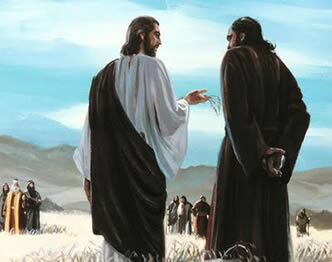
First Reading 1 Kings 19:16b,19-21
Elijah anoints Elisha as his successor.
Responsorial Psalm Psalm 16:1-2,5,7-11
I set the Lord ever before me.
Second Reading Galatians 5:1,13-18
Christ has set us free.
Gospel Reading
Luke 9:51-62
Jesus resolutely determined to journey to Jerusalem.
Background on the Gospel Reading
Today's Gospel reading begins a long section unique to Luke's Gospel. Jesus begins his journey to Jerusalem, which will end with his ministry in Jerusalem. We read that Jesus' days for being “taken up” were fulfilled. The Greek word that Luke uses for “taken up” is the same word he uses to describe the Ascension. We also read that Jesus is determined to journey to Jerusalem. For Luke, Jesus ministry begins in Galilee and then is one long journey to Jerusalem. In Jerusalem he will meet his death but also enter into his glory. Only in Luke does Jesus then spend 40 days in Jerusalem instructing his disciples. It is in Jerusalem that his disciples wait after his Ascension to be sent the Holy Spirit on Pentecost. And it is from Jerusalem, in Luke's second volume, the Acts of the Apostles, that the Good News is spread to Rome and the ends of the earth.
Immediately Jesus is met with rejection, as a Samaritan village will not receive him because he is going to Jerusalem. There was animosity between Samaritans who worshiped on Mount Gerazim and Jews who worshiped in Jerusalem. Jesus was also rejected as he began his ministry in Galilee in Chapter 4. And he will be rejected for the last time when he reaches Jerusalem. James and John want to call down fire from heaven to destroy the people in the village, but Jesus rebukes them and moves on. There is often the temptation to use violence to achieve right. Jesus has come to break this temptation. He is aware that he must undergo violence himself before he can enter his glory.
The rest of today's reading is about the radical demands of discipleship. The three people who volunteer to become disciples on this journey show that they do not understand the demands Jesus will make of them. Neither care of self, care for the dead, nor care of one's family (as required by the Fourth Commandment) can come before the demands of discipleship. Jesus reminds the first volunteer, who would go wherever Jesus goes, that animals in the wild have more security than do Jesus and his followers. The second, who wants to bury a parent, is reminded that the demands of proclaiming the Kingdom of God take precedence. And the third, who wants to say farewell to his family, is reminded that once you put your hand to the plow you cannot look back or the furrow will be crooked. Such a person is not ready for the Kingdom of God.
Jesus seems harsh here, but he is only asking of his disciples what he asks of himself. Jesus' unconditional commitment to God's saving work will demand of him his life. He knows this, but the disciples do not understand. Jesus does not want anyone to rush into discipleship, because the demands of discipleship require everyone considering it to be aware of the cost, make Jesus and his mission central to his life, and then go forward without looking back
No comments yet. Be the first to say something!